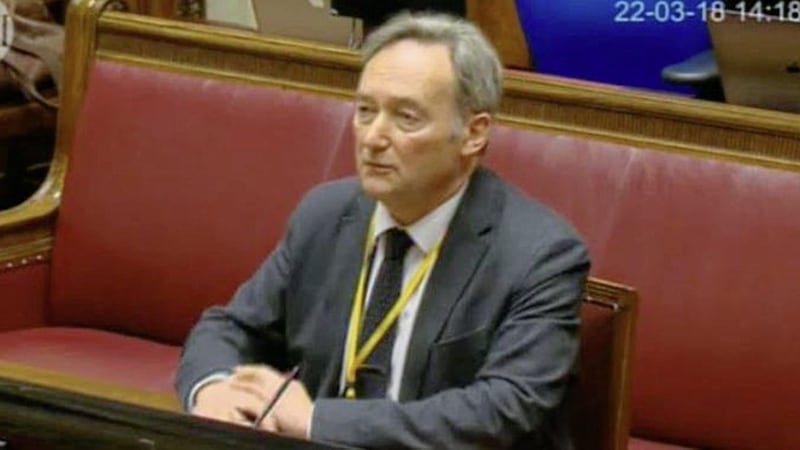THE civil servant who ran the government energy team responsible for the Renewable Heat Incentive (RHI) scheme yesterday said "big decisions" were "thrust upon" him as soon as he was appointed.
John Mills also told the inquiry that when he succeeded Fiona Hepper as DETI's energy boss, there was "only a half-day briefing session" given about the job.
Mr Mills, who was responsible for the RHI scheme from January 2014 through a key period when flaws began to emerge, described how it was an "extremely heavily loaded" post.
The senior civil servant also claimed the decision to delay cost controls on the botched scheme was taken before he joined the energy team.
The then Department of Enterprise, Trade and Investment's (DETI) plan to develop the RHI scheme in 2014 had originally included the addition of cost controls and the opening of a similar initiative for domestic users.
Asked why the scheme was pushed ahead, he told the inquiry yesterday that "these decisions seemed to me to have been taken before my arrival".
He added that he simply "followed the advice I was given" in rubber-stamping it.
Detailing how there was some "extremely impenetrable" work to be done on projects of real "complexity", Mr Mills said there was no overlap with Ms Hepper after she left in November 2013.
He also described how "big decisions" were "thrust upon" him as soon as he took up the role and he was reluctant to make them given his relative inexperience in the post.
The inquiry yesterday also discussed how one of the conditions of approval for the RHI scheme was that a "full review" was to be carried out by the start of 2014. But that never happened and an important opportunity to spot some of the defects was missed.
Mr Mills told the panel he was unaware of the review and of its "critical" importance when he joined the department. He said "if it really was that front and centre" it should have been outlined to him.
His evidence came after the north's most senior civil servant yesterday appeared before the inquiry for a third time and accepted that more credence should have been given to concerns by so-called whistleblower Janette O'Hagan.
David Sterling told the inquiry there is now a "much, much reduced likelihood" of similar concerns being dismissed in such a way.
Mr Sterling said Ms O'Hagan tried to draw then DETI minister Arlene Foster's attention to a major flaw in the RHI scheme.
She twice emailed the minister in 2013 and also told three civil servants the scheme was so lucrative that claimants were producing heat just to collect cash.
But her concerns were dismissed.
Mr Sterling yesterday said the approach taken by civil servants to Ms O'Hagan's concerns had "surprised" him.
"Had they taken what Ms O'Hagan said and gone and looked at the OFGEM reports that were available, I think it was clear at that stage that there was evidence to back up what she was saying," he said.
The senior civil servant also commented that "lessons have been learned and culture has changed" following the failed RHI scheme.
He said the RHI debacle has caused the civil service to re-examine its workings and a "change of culture and mindset" has since taken place.
"Even though this was something which occurred within a small area of a small division of a small department... we know we have a job to do to rebuild confidence in the general public that we are capable of delivering," he said.








